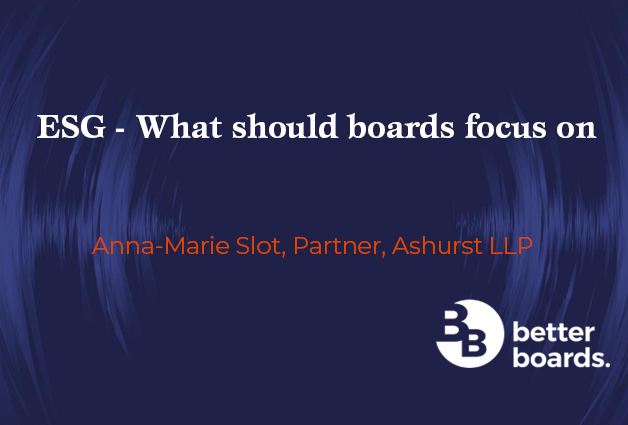Environmental, Social and Governance: The Changing Landscape

Sustainability is an issue that affects us all, with investors and consumers alike challenging the status quo. However, the issues surrounding ESG are multi-layered and complex, with no straight answers. It can be overwhelming and daunting.
In this podcast, Dr Sabine Dembkowski discusses environmental, social and governance (ESG) issues with Anna-Marie Slot from global law firm Ashurst LLP, recently named Most Innovative Sustainable Lawyer at the 2021 FT Innovative Lawyers Awards.
Anna-Marie Slot is Global ESG/Sustainability Partner and Global Head of High Yield at Ashurst. She leads the firm’s ESG strategy and established the firm’s Sustainability Goals, co-created Ashurst’s first digital product, “ESGReady,” and launched Ashurst’s first ESG-related podcast series, “30 for Net Zero 30”.
The three key takeaways from this podcast are:
- Don’t be afraid to start – There are experts out there, but you need to embrace uncertainty and start working on these issues as a company.
- Look at the information out there – Organisations such as Chapter Zero are providing the information you can look at while you are considering your ESG approach
- ESG is both a risk and an opportunity – Dealing with ESG issues now are a seed you can plant that your company will see the benefits of in the long term
The things high-performing board do
From her experience, Anna-Marie highlights five things high-performing boards do
- They have a high level of awareness of ESG issues.
- They understand materiality – What material matters are key to improving the environmental performance of the organisation?
- They embrace uncertainty and accept that they may not necessarily have the expertise to start with but are able to adapt and change.
- They know the business eco-system – from stakeholders to every employee in the business.
- They know that ESG is not just a risk but also a big opportunity, possibly a competitive edge
Anna-Marie cites COVID as an example where a major event precipitated board evaluations, forcing an examination of the supply chain’s ability to adapt. This is not easy to integrate into a typical board calendar. Still, board effectiveness can come from different approaches – some boards create specific ESG sub-committees, while others have included it as part of their audit function.
She stresses that the effectiveness of boards around ESG issues depends on not having a silo mentality, yet appreciating this can sometimes be very difficult.
Look at the information out there
“You have to be comfortable enough to say ‘I don’t know the answer to that and I need to find someone that does’.”
Anna-Marie describes how companies bring in consultants to find the knowledge necessary to address ESG issues, but she advises caution. Boards should check those who offer their services have the skillset required to address the issues.
Anna-Marie recommends Chapter Zero in the UK, business chambers in other countries, and industry-specific organisations that can allow companies to make better sustainability decisions as part of their drive for improved board effectiveness.
ESG is a risk and an opportunity
“(ESG) is not something that can be siloed into one part of your business any longer”
Anna-Marie highlights that the challenge of ESG issues is that they are complex and can not be siloed into one part of the organisation. What is more, a common language and understanding has yet to emerge in many boardrooms. The use of ‘Net zero’ is one of the examples. Anna-Maria found that it is not clear what boards refer to – carbon emissions? Methane emissions? Whether or not this involves off-setting? More forward-looking organisations work towards establishing a common understanding of key terms. She also acknowledges that this is a process and that requires time and repeated messaging.
Don’t forget to subscribe never to miss an episode of the Better Boards Podcast Series. Available on Apple, Spotify or Google.
To find out how you can participate in the Better Boards Podcast Series or more information on Better Boards’ solutions, please email us at info@better-boards.com.



